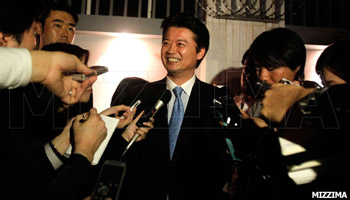Following the E.U. by a few months, Japan is expected to resume yen loans this spring for development projects in Burma, a senior government official the Japanese media on Thursday.

Japanese Foreign Minister Koichiro Gemba talks to the media after meeting with opposition leader Aung San Suu Kyi at her home in Rangoon on Monday, December 26, 2011. Gemba was in Burma to consider resuming economic development funding to Burma, in light of recent democratic reforms. Photo: Mizzima
The development aid, the first since the late 1980s, is expected to be announced when Burmese President Thein Sein visits Japan in April during the Japan-Mekong summit, an official told The Mainichi Dailynewspaper.
Japan is host to the summit with the Mekong basin countries of Cambodia, Laos, Burma, Thailand and Vietnam in Tokyo on April 21, according to the official who spoke anonymously.
Chief Cabinet Secretary Osamu Fujimura told the newspaper on Thursday that the government is in talks with Burmese officials now about the development loans. The discussions started in late November when Japanese officials visited Burma.
The officials said the government is watching Burma’s April 1 by-election to determine if it is free and fair before making a final decision.
Burma, the former military-dominated country, must first reach an agreement on how to repay a 480 billion yen debt to Japan, said Japanese officials. Unlike the U.S. and Europe, Japan has maintained trade ties with Burma and did not impose tough sanctions even during the long period of military rule in the Southeast Asian country.
Japan, along with the U.S. and Europe, has consistently called for Burma to release all political prisoners and to promote democracy and human rights.
Japanese Foreign Minister Koichiro Gemba visited Burma in December, the first visit by a Japanese foreign minister since 2002, as part of international efforts to engage Burma's new military-backed civilian government.
Gemba urged Burma’s leaders to make more progress on the fledgling reforms that have seen the new nominally civilian government release some political prisoners, and ease restrictions on the media and business.
The newspaper said the policy was designed to avoid isolating Burma from the international community.
In an attempt to make the steps toward democracy irreversible, Japan launched bilateral consultations on economic cooperation, including repair of the Lawpita No. 2 hydropower dam, which it originally helped to finance.


